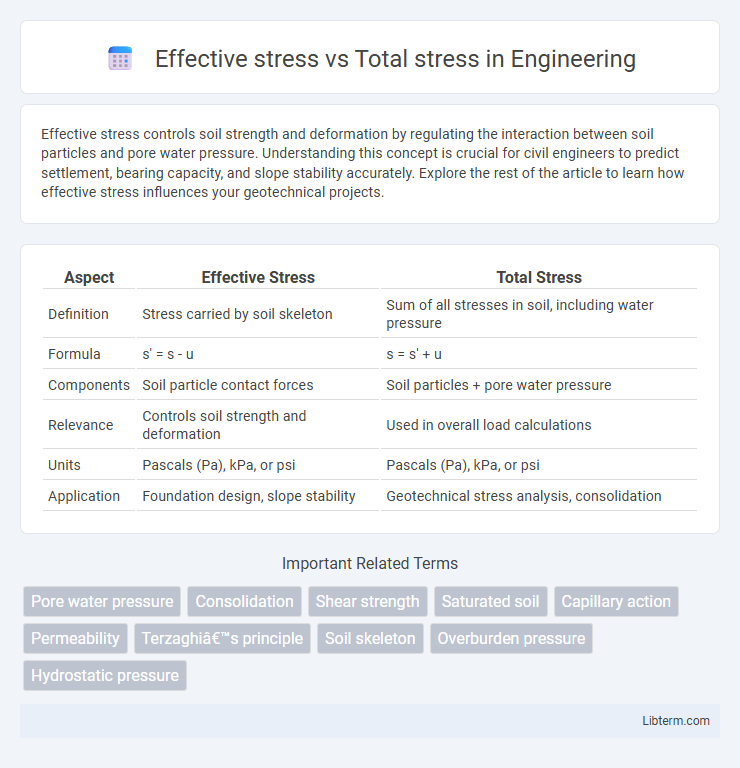Effective stress controls soil strength and deformation by regulating the interaction between soil particles and pore water pressure. Understanding this concept is crucial for civil engineers to predict settlement, bearing capacity, and slope stability accurately. Explore the rest of the article to learn how effective stress influences your geotechnical projects.
Table of Comparison
| Aspect | Effective Stress | Total Stress |
|---|---|---|
| Definition | Stress carried by soil skeleton | Sum of all stresses in soil, including water pressure |
| Formula | s' = s - u | s = s' + u |
| Components | Soil particle contact forces | Soil particles + pore water pressure |
| Relevance | Controls soil strength and deformation | Used in overall load calculations |
| Units | Pascals (Pa), kPa, or psi | Pascals (Pa), kPa, or psi |
| Application | Foundation design, slope stability | Geotechnical stress analysis, consolidation |
Understanding Effective Stress and Total Stress
Effective stress quantifies the stress transmitted through soil grains, directly influencing soil strength and deformation properties, while total stress includes both the effective stress and pore water pressure acting within the soil mass. Understanding effective stress is crucial for predicting soil behavior under load, as it governs shear strength and consolidation processes. Total stress encompasses all external forces applied to the soil, but only the effective stress controls how soil particles interact and respond mechanically.
The Fundamentals of Soil Stress Components
Effective stress defines the stress transmitted through soil skeleton particles, fundamentally governing soil strength and deformation behavior. Total stress represents the complete stress imposed on soil, including both the effective stress and the pore water pressure, crucial for assessing soil stability. Understanding the interaction between effective stress and pore water pressure is essential for accurately interpreting soil consolidation, shear strength, and settlement characteristics.
Differences Between Effective Stress and Total Stress
Effective stress represents the actual stress transmitted through the soil skeleton and governs soil strength and deformation, while total stress includes both the effective stress and the pore water pressure within the soil. Unlike total stress, which accounts for the entire load applied to a soil mass, effective stress directly influences soil behavior by controlling particle interactions and shear strength. The critical distinction lies in effective stress determining soil stability, whereas total stress reflects the combined impact of solid and fluid phases in the soil system.
The Role of Pore Water Pressure in Stress Analysis
Effective stress governs soil strength and deformation by accounting for the total stress minus the pore water pressure within soil pores. Pore water pressure counteracts some of the total stress, reducing the stress transmitted to soil particles, thereby influencing settlement and shear strength. Understanding the interaction between pore water pressure and total stress is crucial for accurate geotechnical design and stability analysis of foundations and slopes.
Mathematical Expressions of Effective and Total Stress
Effective stress (s') is mathematically expressed as s' = s - u, where s represents total stress and u denotes pore water pressure. Total stress (s) comprises both the stress carried by soil particles and the pore water pressure within the soil matrix. Understanding these relationships through their mathematical expressions is critical for analyzing soil behavior under various loading conditions.
Importance of Effective Stress in Geotechnical Engineering
Effective stress governs soil strength and deformation behavior by representing the stress transmitted through soil particles, excluding pore water pressure influences. Total stress includes both soil particle stress and pore water pressure, but does not directly control soil shear strength or settlement. Understanding effective stress is critical in geotechnical engineering for accurate predictions of slope stability, bearing capacity, and consolidation settlements in saturated soils.
Factors Influencing Effective and Total Stress
Effective stress is influenced by soil particle contact and pore water pressure, where total stress is the sum of all stresses acting on a soil mass, including both effective stress and pore water pressure. Factors such as soil type, moisture content, and depth affect total stress by altering the weight of the overlying soil and water. Variations in pore water pressure, drainage conditions, and soil permeability primarily influence effective stress, determining the soil's strength and deformation behavior.
Practical Applications of Stress Concepts in Soil Mechanics
Effective stress governs soil strength and deformation, crucial for designing stable foundations and retaining walls. Total stress represents the combined load on soil, but pore water pressure reduces effective stress, influencing settlement and shear strength. Accurate calculation of effective stress ensures reliable predictions in slope stability analysis and earth pressure assessments, optimizing construction safety and performance.
Measuring Effective Stress in the Field
Measuring effective stress in the field involves precise determination of both total stress and pore water pressure within soil layers, typically using piezometers to capture pore pressure values. Total stress is calculated from the overburden pressure caused by soil and any structural load, while effective stress is derived by subtracting pore water pressure from total stress. Accurate field measurement of effective stress is critical for evaluating soil strength, predicting settlement, and ensuring the stability of geotechnical structures.
Impact of Effective and Total Stress on Soil Stability
Effective stress governs the shear strength and deformation characteristics of soil, directly impacting slope stability and foundation bearing capacity. Total stress includes the weight of soil and pore water pressure, but only effective stress contributes to soil strength and stability analysis. Understanding the distinction helps engineers design safer earth structures by accurately predicting potential failures and settlement behavior.
Effective stress Infographic

 libterm.com
libterm.com